
Related
A group of more than 60 journalism professors has written to The New York Times calling on the paper to commission an independent review of its report that members of Hamas committed widespread sexual violence on October 7. Numerous media outlets, as well as some of the paper’s own staff, have raised questions about the December 28 article headlined “Screams Without Words,” reported in part by a freelance Israeli journalist who had liked multiple posts on social media advocating for violence against Palestinians. The Times has even published subsequent reporting undercutting some of the key elements of the article, which was used by Israeli leaders and Western allies as justification for the brutal military campaign in Gaza that had already killed tens of thousands of Palestinians up to that point. “It was very troubling to professors of journalism to see such a shoddy article be published without a retraction or an investigation,” says Rutgers media studies professor Deepa Kumar, one of the signatories, author of Islamophobia and the Politics of Empire. She also says that as an academic, she is troubled by the mainstream media’s depiction of student encampments as places of hate and violence. “For those of us who have been to these encampments, we know that the atmosphere there is peaceful until the police show up and start to create chaos. … These are fantastic spaces of learning.”
Transcript
AMY GOODMAN: This is Democracy Now!, democracynow.org, The War and Peace Report. I’m Amy Goodman.
More than 60 journalism professors around the United States have written to The New York Times calling on the paper to commission an independent review of its report that members of Hamas committed widespread sexual violence on October 7th. Numerous media outlets have raised questions about the paper’s reporting, which was written in part by a freelance Israeli journalist, or reported by her, who had liked multiple posts on social media advocating for violence against Palestinians.
Last week, Democracy Now!'s Juan González and I spoke to one of the letter's signatories, Rutgers University journalism and media studies professor Deepa Kumar, author of Islamophobia and the Politics of Empire: 20 Years after 9/11. I began by asking her what prompted the letter.
DEEPA KUMAR: Basically, after this particular article, “Screams Without Words: How Hamas Weaponized Sexual Violence on Oct. 7,” came out, there have been numerous reports that have debunked its primary claims. And several journalism professors started to talk about what it means for The New York Times to run a piece like this even though its key claims have been debunked. And so, a group of journalism professors got together and crafted this letter to The New York Times to, as you say, set up an investigative — an independent investigation of how the story was reported, written and published.
And at the center of the controversy, really, is how the two freelancers who were recruited, particularly Anat Schwartz, who’s not a journalist at all — she’s an Israeli filmmaker and an intelligence officer for the — former Israeli officer for the Air Force, and she has no experience doing journalism. She’s recruited to do this story. And what The Intercept, for instance, and Jeremy Scahill — you’ve had him on the show to talk about this story — what they have shown is how she went around trying to find evidence for the claim that there was systematic violence against women on October 7th and couldn’t find any. She phones Israeli hospitals, rape crisis centers, rape crisis hotlines, and she couldn’t find any evidence, and so she turns to more dubious sources in order to actually create this story. And this is in her own words, right? They are quoting Anat Schwartz in her own words. And I encourage viewers to go check out that story.
And so, it was very troubling to professors of journalism to see such a shoddy article be published without a retraction or an investigation. And so it became important for us to write this letter and to send it to The New York Times.
JUAN GONZÁLEZ: And, Deepa, The Intercept had a recent story about how journalists at The New York Times were encouraged to, quote, “restrict the use of the terms 'genocide' and 'ethnic cleansing' and to 'avoid' using the phrase 'occupied territory'” when describing Palestinians. Your response to these kinds of guidelines?
DEEPA KUMAR: Absolutely. I mean, I actually wrote an open letter back in November to The New York Times really criticizing the very skewed way in which this genocide, this war on Gaza, was being represented. And I had a problem with the way in which the key tag is the “Israel-Hamas war.” That’s deeply problematic for a number of reasons, not least that Hamas is not a country. Gaza is not a country. Gazans do not have an army, a navy, an air force or nuclear weapons in the way that Israel does. This is a wholesale slaughter of Palestinian people, a genocide in the works. And unfortunately, that has really — that right from the get-go, right? And I’m so glad that these memos are showing that this was intentional, right? This was not an accident, that, in fact, it’s been very skewed in its coverage of what is going on. So, what’s wrong with that phrase is also that by focusing on Hamas and repeatedly putting a spotlight on the tragedy of October 7th, what happens is it suggests that there was no history before October 7th. And the paper is actually justifying the actions of Israel in Gaza from then on. And that’s just, you know, completely one-sided, and it’s not what journalism is supposed to be.
I’ll just say one more thing about the “Screams Without Words” article. And that is that I don’t want to come off saying that there was no sexual violence on October 7th. I think that would be a problem. And in fact, The Intercept story does not say that. What it says is that there wasn’t systematic — there wasn’t a campaign of systematic sexual violence. And that is important, because, in fact, if there was one, that is horrific, isn’t it? And in the climate that we’re in today, where the gains of the #MeToo movement are being rolled back, most recently with the sentence being overturned for Harvey Weinstein, it’s very important to take women seriously.
But I will say this, that this is also a piece of propaganda, right? Because it draws from a narrative that has a much longer history in settler-colonial societies, where sexual violence, alleged sexual violence, against particularly white women becomes the basis for genocide. This is true in the United States. Scholars have documented this and researched this quite well, how the alleged rape of white women became the basis from which to slaughter Indigenous people, to slaughter Native Americans. This was used also against African Americans. Frederick Douglass talks about the myth of the Black rapist, where, you know, alleged sexual violence by Black men was used to justify mass lynchings. And, unfortunately, this piece in The New York Times is really the latest iteration of this longer narrative that then serves to justify violence.
AMY GOODMAN: I wanted to go to a piece in The New York Times. They retracted a part of their December story on March 25th, though, to be clear, they didn’t issue a correction. But this is what they wrote: “New video has surfaced that undercuts the account of an Israeli military paramedic who said two teenagers killed in the Hamas-led terrorist attack on Oct. 7 were sexually assaulted. The unnamed paramedic, from an Israeli commando unit, was among dozens of people interviewed for a Dec. 28 article by The New York Times that examined sexual violence on Oct. 7. He said he discovered the bodies of two partially clothed teenage girls in a home in Kibbutz Be’eri that bore signs of sexual violence. … But footage taken by an Israeli soldier who was in Be’eri on Oct. 7, which was viewed by leading community members in February and by The Times this month, shows the bodies of three female victims, fully clothed and with no apparent signs of sexual violence, at a home where many residents had believed the assaults occurred. Though it is unclear if the medic was referring to the same scene, residents said that in no other home in Be’eri were two teenage girls killed, and they concluded from the video that the girls had not been sexually assaulted.” Again, I was reading an article from The New York Times on March 25th. Professor Deepa Kumar, if you can respond?
DEEPA KUMAR: Yes. Thank you for mentioning that article, Amy. And I also want to reference that the podcast of The New York Times, The Daily, was actually going to do a full episode on the “Screams Without Words” article, but when they put it through their standard fact-check, it didn’t pass. So, within The New York Times itself, this story did not pass the basic fact-check. And then, since then, there have been articles, like the one you just mentioned, as well as some corrections, if you will, that have taken place.
But in response to our letter, we have heard nothing from the editorial board of The New York Times. And I understand that a New York Times spokesperson told The Washington Post that they stand by the story. So, it’s pretty clear that they are not interested in actually holding an independent investigation and moving away from this really shoddy piece of journalism.
AMY GOODMAN: I also wanted to read from Ynet, the news source in Israel, with a headline, “New York Times cuts ties with Israeli reporter over alleged policy violation: American newspaper ends Anat Schwartz’s employment after liking pro-Israel posts on social media, including one that called to turn Gaza 'into a slaughterhouse,' sparking calls from pro-Palestinian groups to review her employment.” Again, she was one of the authors of this December 28th New York Times piece, Deepa Kumar.
DEEPA KUMAR: Yes, she was in fact the key person gathering the information, along with her partner’s nephew, on the ground, and Jeffrey Gettleman is the one who actually — he’s a New York Times journalist, award-winning, I might add — who actually wrote the story. And I’ll just say very quickly something about Gettleman, which is that at one interview with Sheryl Sandberg, he actually questioned what evidence was, saying that evidence is a legal term, and it’s not something that journalists apparently look for, which is just bizarre. These are the basics of any — you go to a J school, and this is what they teach you. You have to have evidence. You have to fact-check. And so, you know, it’s just shocking.
We’ve also heard from journalists inside The New York Times saying how happy they are that this letter was sent, because they describe the climate inside The New York Times as a very stifling environment, one which is very tightly controlled. You know, so much for free speech. So much for the newspaper of record.
And I just want to say that the reason that many of us argue and criticize The New York Times is not because we think that The New York Times is worse than the New York Post or, you know, Fox News or whatever. You know, those news media outlets don’t even pretend to be neutral, to be objective and so on, whereas The New York Times does. The New York Times says it adheres to the standards of professional journalism. And here we have such an out-and-out propaganda story that, you know, they have just dug their heels in around in terms of allowing for an investigation, much less retracting the story.
JUAN GONZÁLEZ: Deepa, what about the current student protests and the push at all these campuses for divestment from Israel of the university endowments, how the Times has been covering these student movements, from your perspective?
DEEPA KUMAR: Yeah. I mean, I’ll first say that these movements are incredible. This is the largest protest movement, solidarity movement with Palestine that I have seen in my lifetime, in over 30 years of being an activist. And this is probably the biggest movement in support of Palestinians in the history of the United States. And for those of us who have been to these encampments, we know that the atmosphere there is peaceful until the police show up and start to create chaos.
So, for instance, I was at the University of Pennsylvania encampment last Friday, where two Israeli-born scholars, Omer Bartov and Raz Segal, were speaking about what is antisemitism. And there was a fantastic discussion going on. The people at the encampment were so diverse — Black, Brown, white, Muslim, Jewish and so on. The only disruptor that I saw was a person identified as a rabbi, who came with a sign saying “Mein Camp,” right? This is a play on Hitler’s famous book, calling those at the encampment, you know, Nazis by extension. And he tried to shut it down, and he was gently told to leave. I mean, Raz Segal actually asked him to come and speak, but he preferred to actually, you know, scream at the protesters. So, that’s our experience of going to encampments. These are fantastic spaces of learning, and not just, you know, talking about the history of the region and talking about antisemitism, but as growing as human beings, of being decent human beings with empathy and solidarity with the oppressed. I mean, that’s what a university is for, right? There’s been music. There’s been dancing. There’s been poetry reading. And none of that spirit is captured either in The New York Times or in other newspapers, who, you know, “if it bleeds, it leads.” That’s what we’re seeing.
And I want to say, though, also, that what is particularly troubling is that the Times, as well as other newspapers, are going with the charges coming from politicians, from congressional figures, that these encampments are antisemitic. That could not be further from the truth. There is so little evidence presented to actually validate this point. Instead, what they turn to is that the protesters have slogans which say, “From the river to the sea, Palestinians will be free.” Now, some have chosen to interpret this as a call for genocide against Jewish Israelis. The only way you could actually reach that conclusion is if you actually have a settler-colonial mentality. Remember, of course, that in 1977, in their election platform, the Likud party had exactly such a slogan. They want an Israeli state from the Jordan River to the Mediterranean Sea. And for them, that means genocide. It means displacement. It means ethnic cleansing. That’s not what the protesters are saying. What the protesters are saying is that we want freedom for Palestinians, we want human rights and democracy, from the river to the sea. Because what occurs to me when people oppose the slogan is: Where exactly do you want Palestinians to be unfree, from the river to the sea? So, central to this slogan, which is not at all antisemitic, is really the charge to end apartheid. It is to create a free, democratic, whatever you want to call it, Israel-Palestine in this region, where Israelis and Palestinians can live side by side. And this is possible.
AMY GOODMAN: Rutgers University journalism and media studies professor Deepa Kumar, speaking to us from Philadelphia.
Coming up, an historic case against the U.S. military contractor CACI ends in mistrial. It’s around the notorious Abu Ghraib prison torture scandal. Stay with us.

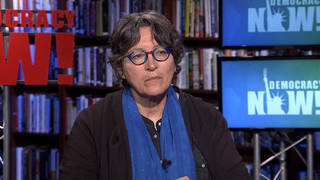
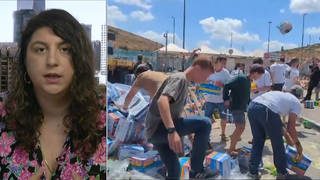
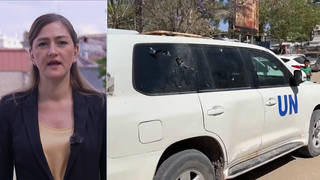
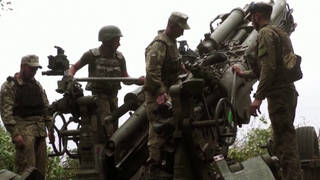
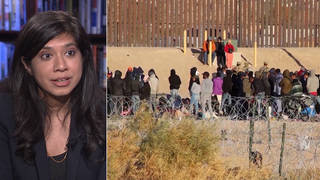




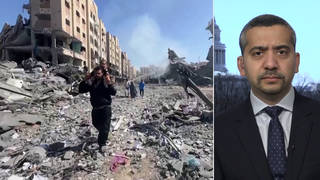
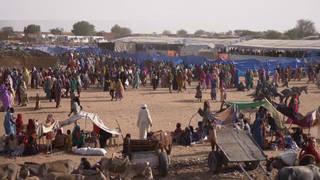
Media Options